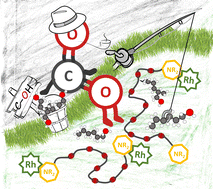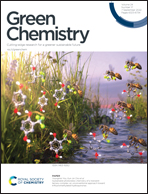Solvent design for catalyst recycling of rhodium/amine catalysts via scCO2 extraction in the reductive hydroformylation of alpha olefins†
Abstract
Efficient transformation protocols to directly convert olefins to alcohols are highly sought after. Ethylene glycol based solvents have proved to support the reductive hydroformylation of linear alpha olefins to alcohols using [Rh(acac)(CO)2] in combination with tertiary amines as catalysts. Incorporation of the amine functionality into the solvent using 2-[2-(dimethylamino)ethoxy]ethanol allowed simplification of the reaction system to three components and a catalytic activity with a TOF of 280 h−1 for the reductive hydroformylation of 1-octene to be achieved. To immobilize the rhodium catalyst in a recycling approach using scCO2 as the extracting solvent for product alcohols, amine functionalized PEG derivatives have been synthesized as the stationary catalyst phase. Amide condensation of PEG600-diacid with trimethyldiaminoethane resulted in a diaminated PEG600 in which the amine group is linked via an amide bridge to the PEG600 backbone. During nine consecutive runs, in which this PEG600-diamine was used as the stationary catalyst phase and product alcohols have been extracted with scCO2, no loss in activity or selectivity was observed. Leaching of the stationary phase was ≤3 wt% (≤0.5 wt% after the first two runs) of the extracted mass per run and rhodium leaching was determined to be 0.1% of the initial rhodium over all nine runs combined.



 Please wait while we load your content...
Please wait while we load your content...